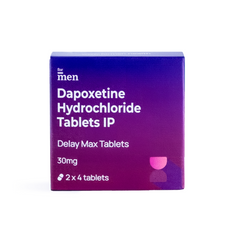Sexually Transmitted Diseases: STD or STI Symptoms in Men
Evidence Based
All the information in this blog post is accurate, trustworthy, scientifically based and has been written and fact-checked by our experts and doctors.
Our licensed nutritionists and dietitians are committed to being objective, unbiased and honest, presenting all sides of the argument.
This article includes scientific references in brackets, which are clickable links to research papers from reputable academic organizations.

Sexually Transmitted Diseases (STDs), also known as sexually transmitted infections (STIs), are a significant public health concern that affects millions of people worldwide. These infections, caused by bacteria, viruses, or parasites, are primarily spread through sexual contact and can lead to severe physical and mental health issues if left untreated. While STDs are often associated with women, men are equally at risk and may experience a wide range of symptoms, from mild discomfort to serious complications that can impact their long-term health and well-being.
Understanding the signs and symptoms of STDs in men is crucial for early detection and treatment, which can prevent the spread of infections and reduce the risk of serious health problems. Here, we’ll explore the most common STDs affecting men, their symptoms, and the best prevention and treatment strategies to maintain sexual health.
What are the Common Symptoms of Sexually Transmitted Diseases (STDs) in Men?
STDs can present a wide range of symptoms, depending on the type of infection.
Below are some of the most common symptoms men might experience:
1. Genital Sores or Blisters:
The appearance of sores, blisters, or rashes on the penis, anus, or other parts of the genital area is a common symptom of several STDs, including herpes and syphilis.
2. Painful Urination or Ejaculation:
Burning or pain during urination or ejaculation can indicate infections such as chlamydia or gonorrhea.
3. Discharge from the Penis:
Abnormal discharge, which may be cloudy, yellow, or green, and may have a foul odor, is a key symptom of infections like gonorrhea and trichomoniasis.
4. Frequent Urination:
An increased need to urinate, particularly if accompanied by pain, can be a sign of several STDs.
5. Systemic Symptoms:
Some STDs cause symptoms beyond the genital area, including fever, fatigue, swollen lymph nodes, and flu-like symptoms.
Specific STDs and Their Symptoms:
1. Chlamydia
Symptoms: Often called a "silent" infection, chlamydia may cause mild symptoms or none at all. When symptoms do occur, they include painful urination, penile discharge, and testicular pain or swelling.
Diagnosis and Treatment: Diagnosis typically involves a urine test or a swab from the urethra. Treatment with antibiotics is effective, but reinfection is possible, so retesting is recommended.
2. Gonorrhea
Symptoms: Gonorrhea symptoms in men include a burning sensation during urination, white, yellow, or green discharge from the penis, and painful or swollen testicles. In some cases, it can also cause rectal symptoms such as itching, soreness, and bleeding.
Diagnosis and Treatment: Diagnosis is done through urine tests or swabs from the infected area. Treatment involves antibiotics, but antibiotic-resistant strains are becoming a concern.
3. Herpes
Symptoms: Herpes simplex virus (HSV) causes painful blisters or sores on the genitals, rectum, or mouth. The first outbreak is usually the most severe, and the virus can remain dormant with periodic flare-ups.
Diagnosis and Treatment: Herpes is diagnosed through physical examination, swab tests, or blood tests. While there is no cure, antiviral medications can help manage symptoms and reduce transmission risk.
4. Syphilis
Symptoms: Syphilis progresses in stages, starting with painless sores (chancres) at the infection site. If untreated, it can lead to secondary symptoms like rashes, fever, and swollen lymph nodes, eventually progressing to severe complications affecting the heart, brain, and other organs.
Diagnosis and Treatment: Blood tests are used for diagnosis. Early-stage syphilis can be effectively treated with antibiotics like penicillin, but the damage caused by late-stage syphilis may be irreversible.
5. Human Papillomavirus (HPV)
Symptoms: HPV can cause genital warts, which are small, flesh-coloured bumps that may cluster into a cauliflower-like shape. High-risk HPV strains can lead to cancers of the throat, anus, and penis.
Diagnosis and Treatment: There is no routine screening for HPV in men, but visible warts can be treated with topical medications, freezing, or surgical removal. Vaccines like Gardasil can prevent many HPV strains.
6. HIV
Symptoms: HIV initially causes flu-like symptoms, such as fever, sore throat, and fatigue. Over time, if untreated, HIV can progress to AIDS, characterised by severe immune system damage, leading to life-threatening infections and cancers.
Diagnosis and Treatment: HIV is diagnosed through blood tests. While there is no cure, antiretroviral therapy (ART) can manage the virus, prolonging life and reducing transmission risk.
7. Hepatitis B
Symptoms: Hepatitis B can cause liver inflammation, leading to symptoms like jaundice, dark urine, abdominal pain, and fatigue. Chronic infection can result in liver damage or cancer.
Diagnosis and Treatment: Blood tests diagnose hepatitis B. Vaccination is the best prevention, and antiviral medications can manage chronic infections.
8. Trichomoniasis
Symptoms: Often asymptomatic, trichomoniasis can cause irritation, discharge, and discomfort during urination or ejaculation.
Diagnosis and Treatment: A swab test is used for diagnosis, and the infection is treatable with antibiotics.
What are the Complications of Untreated STDs?
If left untreated, STDs can lead to severe and sometimes life-threatening complications, including:
- Infertility: Particularly with infections like chlamydia and gonorrhea.
- Cancer: Certain strains of HPV can lead to penile, anal, or throat cancer.
- Organ Damage: Advanced syphilis can damage the heart, brain, and other organs.
- Blindness: In severe cases, untreated syphilis can cause blindness.
How to Prevent and Treat STDs and STIs?
Prevention is key in managing STDs. Here are some effective strategies:
1. Use Condoms: Consistently using condoms during sex significantly reduces the risk of STDs.
Among the top choices in the market, Joy Max Ultra Thin Delay Condoms from the brand ForMen stands out. These condoms are designed for optimal protection and comfort, offering a snug fit that minimizes the risk of slips or breakage. They are non-irritant, paraben-free, and pre-lubricated, ensuring smooth gliding and reducing friction to prevent skin irritation.
2. Get Vaccinated: Vaccines are available for HPV and hepatitis B, protecting against these infections.
3. Regular Testing: Regular screening helps detect infections early, even when no symptoms are present.
4. Limit Sexual Partners: Reducing the number of sexual partners decreases the risk of exposure.
Treatment Depends on the Type of STD:
1. Bacterial Infections: Antibiotics are effective for bacterial STDs like chlamydia, gonorrhea, and syphilis.
2. Viral Infections: Antiviral medications manage conditions like herpes and HIV but do not cure them.
3. Parasitic Infections: Trichomoniasis is treatable with specific antibiotics.
Sexually transmitted diseases are a significant health concern for men, with symptoms that can range from mild to severe. Early detection and treatment are crucial to prevent long-term complications. Practising safe sex, undergoing regular screenings, and being aware of the symptoms are essential steps in maintaining sexual health.
If you suspect you have an STD or have been exposed to one, seek medical attention promptly. Timely intervention can prevent serious health issues and improve your overall well-being.
Also Read the Articles:
- 11 Different Types of Condoms Available in the Market
- How to Choose the Best Condoms for First-Time Sex in India?
- What are the Benefits of Dotted Condoms?
- How to Control Sexual Feelings?
| *** This Article is Written by Swetha Ramala. |
Disclaimer: The information provided on this page is not a substitute for professional medical advice, diagnosis, or treatment. If you have any questions or concerns about your health, please talk to a healthcare professional.

 Evidence Based
Evidence Based







Leave a comment